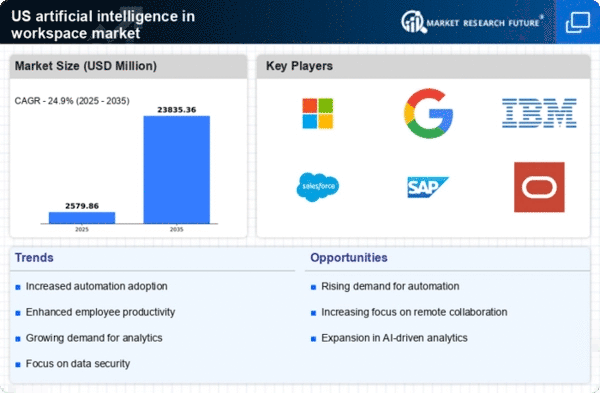Increased Demand for Automation
The artificial intelligence-in-workspace market experiences a notable surge in demand for automation solutions. Organizations are increasingly seeking to streamline operations and enhance productivity through AI-driven tools. According to recent data, the automation segment is projected to grow at a CAGR of 25% over the next five years. This growth is driven by the need for efficiency and cost reduction, as businesses aim to optimize workflows and minimize human error. The integration of AI technologies into various business processes allows for real-time data analysis and decision-making, which is crucial in today's fast-paced environment. As companies recognize the potential of AI to transform their operations, investment in automation technologies is likely to escalate, further propelling the artificial intelligence-in-workspace market.
Growing Investment in AI Startups
Investment in AI startups is rapidly increasing, serving as a significant driver for the artificial intelligence-in-workspace market. Venture capital funding for AI-related ventures has surged, with estimates indicating that investments reached over $20 billion in 2025 alone. This influx of capital is fostering innovation and the development of cutting-edge AI solutions tailored for workplace applications. As startups introduce novel technologies, established companies are likely to adopt these innovations to maintain competitive advantage. The collaboration between startups and larger enterprises is expected to accelerate the integration of AI into various business functions, further propelling the artificial intelligence-in-workspace market. This trend suggests a vibrant ecosystem where new ideas and technologies can flourish.
Integration of AI in HR Processes
The integration of artificial intelligence into human resources (HR) processes is emerging as a critical driver for the artificial intelligence-in-workspace market. Organizations are leveraging AI to enhance recruitment, employee training, and performance evaluation. By utilizing AI algorithms, companies can analyze resumes and identify the best candidates more efficiently, reducing hiring time by up to 50%. Furthermore, AI-driven training programs provide personalized learning experiences, catering to individual employee needs. As organizations strive to build a more skilled workforce, the demand for AI solutions in HR is expected to rise. This trend not only streamlines HR operations but also contributes to employee retention and satisfaction, thereby fostering growth in the artificial intelligence-in-workspace market.
Rising Focus on Employee Well-being
The artificial intelligence-in-workspace market is increasingly influenced by a growing emphasis on employee well-being. Organizations are recognizing that a healthy work environment directly correlates with productivity and employee satisfaction. AI tools that monitor employee engagement and mental health are gaining traction, as they provide insights into workforce dynamics. A recent survey indicates that 70% of companies are investing in AI solutions aimed at enhancing employee experiences. By leveraging AI to analyze employee feedback and performance metrics, organizations can create tailored interventions that promote well-being. This focus on mental health and work-life balance is likely to drive the adoption of AI technologies, thereby contributing to the growth of the artificial intelligence-in-workspace market.
Advancements in Natural Language Processing
Natural Language Processing (NLP) is a pivotal driver in the artificial intelligence-in-workspace market. The advancements in NLP technologies enable machines to understand and interpret human language more effectively. This capability is transforming communication within organizations, facilitating smoother interactions between employees and AI systems. As of November 2025, the NLP segment is expected to account for approximately 30% of the overall AI market share. Companies are increasingly deploying chatbots and virtual assistants powered by NLP to enhance customer service and internal communication. The ability to process and analyze vast amounts of textual data allows organizations to derive actionable insights, thereby improving decision-making processes. Consequently, the growth of NLP technologies is likely to significantly impact the artificial intelligence-in-workspace market.
















